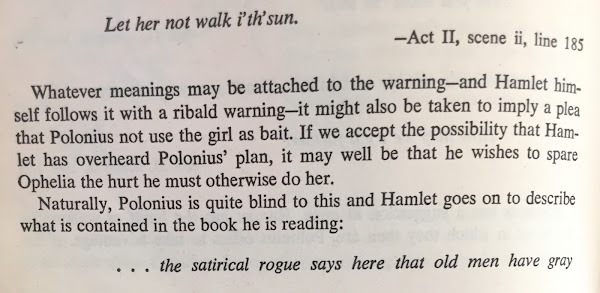Power-Broker Polonius, Ungenerous Jephthah: Notes on Asimov on Hamlet, Part 3
CLAUDIUS' DEBTS OF GRATITUDE TO POLONIUS - RELATED TO HAMLET'S DISLIKE FOR POLONIUS
The text of the play doesn't support speculation about Polonius being involved in Claudius' plot to kill his brother the king. Yet Act I, scene 2, in which Claudius grants Laertes' request to return to France, has Claudius also mention the deep gratitude Claudius feels for Polonius' service to him, in spite of Claudius not having reigned very long. This makes us wonder what Polonius may have done in that short time to inspire such a debt of gratitude in Claudius. Asimov offers some helpful speculation:
This is helpful, as it may not be sufficient to assume Hamlet's dislike for Polonius is related only to his having prohibited Ophelia from seeing him. High school and college students may think in more narrow terms like this regarding interference in the romance as sufficient explanation, but Asimov's observation about court politics makes sense to provide a fuller explanation.
Yet this generosity of Polonius toward Claudius offers an ironic contrast with his advice to his son Laertes about not being a borrower or a lender.
POLONIUS AS UNGENEROUS
Asimov knows that many school children over centuries have memorized Polonius' advice to Laertes. He also knows that Polonius' advice does not inspire generosity, and in fact may often have been used to inspire its opposite:
Polonius is similarly ungenerous with Ophelia and the time she seems to generously offer to the prince, and with Hamlet in his harsh judgment of his motives toward Ophelia. Later, when the players arrive and need to be shown their accomodations in the palace, Hamlet emphasizes the importance of staying on their good side, as they are the abstract and brief chronicles of the age; but Polonius merely says he will give them the sort of accomodations they deserve, and Hamlet quickly corrects him:
In this, as with the instances that Asimov notes, Polonius is his characteristically ungenerous self.
"LET HER NOT WALK I'TH'SUN"
Asimov offers an interesting interpretation of Hamlet's cryptic remark to Polonius about not letting Ophelia walk in the sun due to the risk of conception:
Asimov admits that this interpretation of Hamlet as warning Polonius not to use Ophelia as bait makes the most sense if we assume (as some productions do) that Hamlet overhears Claudius and Polonius plotting to use Ophelia in this way.
If we only view Hamlet's "walk i'th'sun" remarks as being about his personal resentment over being kept from Ophelia's company, we might miss the possible connection of these "sun" remarks with Hamlet's comparison of Polonius to the biblical figure of Jephthah.
POLONIUS AS JEPHTHAH-FIGURE
Hamlet compares Polonius to Jephthah, and Asimov notes that some of this is clearly lost on Polonius:
Hamlet's comparison of Polonius to Jephthah is one of a handful of the more explicit biblical name allusions in the play (along with Adam, the serpent, Cain, Herod, and Baptista or John the Baptist), and it's an important one. Yet many readers and viewers or students of the play today are much more likely to be unfamiliar with the Jephthah tale, unlike audiences in Shakespeare's time, so it's helpful that Asimov explains the allusion.
~~~~~~~~~~~~~~~~~~~~~~~~
~~~~~~~~~~~~~~~~~~~~~~~~
Hamlet quotes: All quotes from Hamlet are taken from the Modern (spelling), Editor's Version at InternetShakespeare via the University of Victoria in Canada. They are often first identified by way of the advanced search feature at OpenSourceShakespeare.org.
~~~~~~~~~~~~~~~~~~~~~~~~
THIS POST IS PART OF A LARGER SERIES, reflecting on an in reaction toIsaac Asimov's treatment of Hamlet in his two-volume work, Asimov's Guide to Shakespeare.
Part 7: Overall Major Stengths & Weaknesses (Asimov on Hamlet)
Part 6: Why Rosencrantz & Guildenstern Must Die
Part 5: Chameleon Hamlet & 1 Cor 9
Part 4: Suicide, Survival, Adaptivity, & Resistance
Part 3: Power-Broker Polonius, Ungenerous Jephthah
Part 2: Niobe & the Nemean Lion
Part 1: Wicked Uncles
~~~~~~~~~~~~~~~~~~~~~~~~~~
This post later also became first in a series of posts on Jephthah in Hamlet.
For those interested in reading more on Jephthah and Hamlet:
INDEX OF POSTS ON JEPHTHAH IN HAMLET:
https://pauladrianfried.blogspot.com/2021/02/jephthah-series-pay-attention-be-astonished-tell.html
~~~~~~~~~~~~~~~~~~~~~~~~~~~~~~~~~~~~~~~~~~~~~~~
INDEX: NOTES ON ASIMOV ON HAMLET:
https://pauladrianfried.blogspot.com/2024/08/index-asimov-on-hamlet.html
~~~~~~~~~~~~~~~~~~~~~~~~~~~~~~~
~~~~~~~~~~~~~~~~~~~~~~~~~~~~~~~
YOU CAN SUPPORT ME on a one-time "tip" basis on Ko-Fi:
https://ko-fi.com/pauladrianfried
IF YOU WOULD PREFER to support me on a REGULAR basis,
you may do so on Ko-Fi, or here on Patreon:
https://patreon.com/PaulAdrianFried
~~~~~~~~~~~~~~~~~~~~~~~~~~~~~~~
~~~~~~~~~~~~~~~~~~~~~~~~~~~~~~~
Disclaimer: If and when I quote or paraphrase bible passages or mention religion in many of my blog posts, I do not intend to promote any religion over another, nor am I attempting to promote religious belief in general; only to explore how the Bible and religion influenced Shakespeare, his plays, and his age.
~~~~~~~~~~~~~~~~~~~~~~~~~~~~~~~~~~~~~~
~~~~~~~~~~~~~~~~~~~~~~~~~~~~~~~~~~~~~~
Thanks for reading!
~~~~~~~~~~~~~~~~~~~~~~~~~~~~~~~~~~~~~~
~~~~~~~~~~~~~~~~~~~~~~~~~~~~~~~~~~~~~~
My current project is a book tentatively titled Hamlet’s Bible, about biblical allusions and plot echoes in Hamlet.
Below is a link to a list of some of my top posts (“greatest hits”), including a description of my book project (last item on the list):
https://pauladrianfried.blogspot.com/2019/12/top-20-hamlet-bible-posts.html
I post every week, so please visit as often as you like and consider FOLLOWING.
To find the FOLLOW button, go to the home page: https://pauladrianfried.blogspot.com/
see the = drop-down menu with three lines in the upper left.
From there you can click FOLLOW and see options.









1) https://www.abarim-publications.com/Meaning/Jephthah.html#.X34MrFl7lt8
ReplyDelete2) https://jwa.org/encyclopedia/article/jephthahs-daughter-midrash-and-aggadah
3) https://www.chabad.org/library/article_cdo/aid/111853/jewish/Jephthah-Yiftach.htm
Thank you, Michael!
Delete